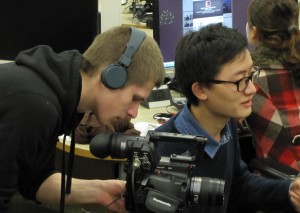David Baines
David Baines is a senior lecturer in Journalism at Newcastle University. David spent many years as a journalist working for daily newspapers, and writes this blog following the Global Pop-Up Newsroom on 16th November. David’s journalism students investigated critical themes of austerity, poverty and deprivation, in collaboration with colleagues in the US, India and Taiwan. The Newcastle University students reported live from Newcastle on Saturday 16th November whilst their colleagues reported using the same methods from Los Angeles, Chennai and Taipei. Follow Pop Up News on Twitter @PopUpNewsUk
Journalism students in Newcastle, the US, India and Taiwan have taken part in a 24-hour global project reporting digitally on deprivation, poverty and austerity. They used their mobile phones, and social media such as Twitter and Facebook, to report live from the streets of Newcastle on Saturday, November 26 – while their colleagues were out and about in Los Angeles, Chennai and Taipei.
The students had spent several weeks researching, making contacts and preparing some content in advance to be loaded up on the day to two websites, one run from Newcastle University (www.popupnewsuk.net), and one from California (www.popupnewsroom.net).
The students in the UK, US and India also posted their work on Twitter and their live reports on the Saturday were distributed on Twitter. One hashtag alone, #livepoverty, attracted more than a third of a million impressions on the day.
 Because of dateline differences, the Newcastle students and several members of staff were working from 9pm until 4am on Friday night, Saturday morning to set up the www.popupnewsuk.net site, from 9am until 9pm on the Saturday reporting live, editing and uploading the reports, videos, podcasts, texts and images. Two PhD students, Tingting Li and Yu-Chih Lin, worked through the night to translate and upload the reports from Taiwan, then produced a feature on the Little Sisters of the Poor on the Saturday.
Because of dateline differences, the Newcastle students and several members of staff were working from 9pm until 4am on Friday night, Saturday morning to set up the www.popupnewsuk.net site, from 9am until 9pm on the Saturday reporting live, editing and uploading the reports, videos, podcasts, texts and images. Two PhD students, Tingting Li and Yu-Chih Lin, worked through the night to translate and upload the reports from Taiwan, then produced a feature on the Little Sisters of the Poor on the Saturday.
This international collaboration in journalism education, a world-first, is now to be embedded in the Newcastle University masters programmes in International Multi-Media Journalism and Media and Journalism, and in the programmes at California State University at Northridge, the Asian College of Journalism in Chennai and National Chung Cheng University in Taiwan.
One aim of the project was to explore how complex issues such as poverty and deprivation could be reported on using social media and commonplace equipment such as phones in such a way that made the complexities transparent, rather than generating simplifications. And in that it was a success. The range of reports, of diverse issues, of faces which rarely appear in the media and voices which are rarely heard was enormous.
See for example, the ‘cloud’ on which the ACJ reports on Twitter were curated after the event: http://infomous.com/node/45433
The idea for the international collaboration arose during a conversation at the triennial World Journalism Education Congress in Belgium in June with Professor Melissa Wall at California State University (CSUN) when we were both presenting papers on similar themes. CSUN students had undertaken pop-up news projects, reporting through social media on events such as the Oscars and LA Marathon; students at Newcastle had reported in a similar way on the Turner Prize at Baltic and those at the ACJ on the literary festival run by national newspaper The Hindu. Furthermore, a tutor on the ACJ’s multi-media journalism course is Devadas Rajaram, a graduate of Newcastle University’s MA in international Multimedia Journalism.
The topic of poverty deprivation and austerity was chosen not simply because of its global saliency, but because the ACJ’s programme is internationally-renowned for its element on reporting deprivation and the Newcastle programme is informed by research conducted by the Joseph Rowntree Foundation on the media and poverty in the UK.
In educational terms, the project was embraced with real enthusiasm by our students. More than 50 took part in it, giving up days of their time and working through a weekend on project which was ungraded.
Around 80% of our students come from overseas and it was terrific to see everyone working together as one big team. It had at first seemed a strange topic to report on for some of our overseas students. Poverty? This is Britain! But they leaned a lot more about life in Britain, and met and interacted with more local people, in these few weeks than some get the chance to in a full year here.
Staff members were on hand to help with guidance now and then, and Chris Falzon and Ian Wylie had put in a great deal of work to build the sites and make sure that the social media and web platforms all worked and linked up internationally. But the students took ownership of the project and the staff’s main duties on the day were making rounds of tea and coffee.
And they all produced some first-rate, high level journalism!

